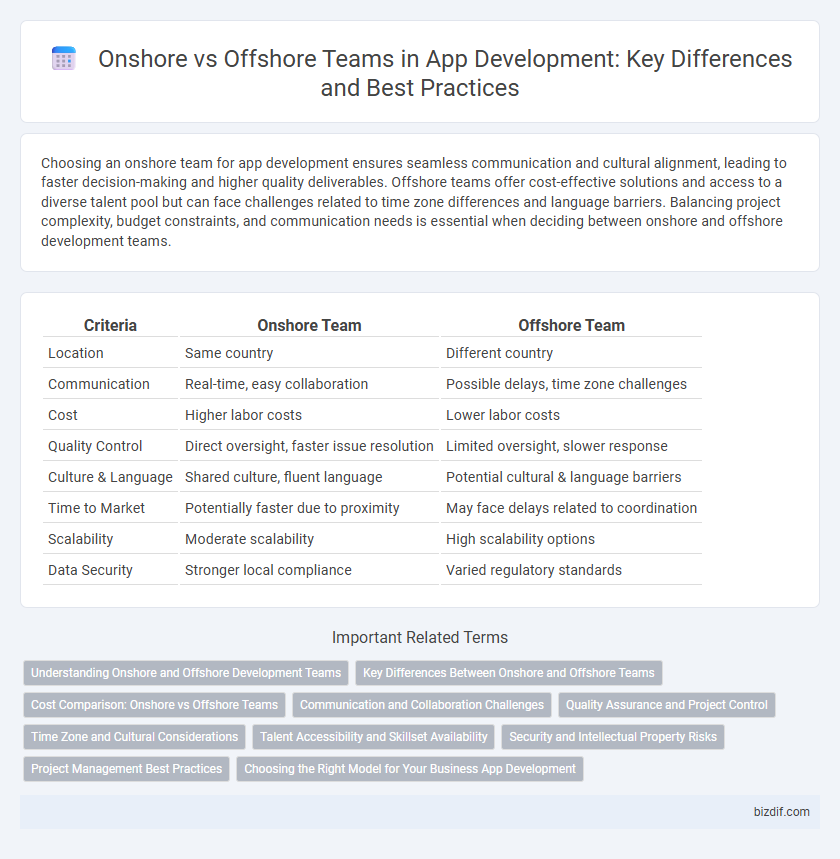Choosing an onshore team for app development ensures seamless communication and cultural alignment, leading to faster decision-making and higher quality deliverables. Offshore teams offer cost-effective solutions and access to a diverse talent pool but can face challenges related to time zone differences and language barriers. Balancing project complexity, budget constraints, and communication needs is essential when deciding between onshore and offshore development teams.
Table of Comparison
| Criteria | Onshore Team | Offshore Team |
|---|---|---|
| Location | Same country | Different country |
| Communication | Real-time, easy collaboration | Possible delays, time zone challenges |
| Cost | Higher labor costs | Lower labor costs |
| Quality Control | Direct oversight, faster issue resolution | Limited oversight, slower response |
| Culture & Language | Shared culture, fluent language | Potential cultural & language barriers |
| Time to Market | Potentially faster due to proximity | May face delays related to coordination |
| Scalability | Moderate scalability | High scalability options |
| Data Security | Stronger local compliance | Varied regulatory standards |
Understanding Onshore and Offshore Development Teams
Onshore development teams operate within the client's country, offering real-time collaboration, cultural alignment, and easier communication, which accelerates project timelines and reduces misunderstandings. Offshore development teams are based in different countries, often providing cost-effective solutions with access to a broader talent pool but may face challenges like time zone differences and language barriers. Choosing between onshore and offshore teams depends on balancing budget constraints, project complexity, and the importance of direct interaction for agile app development.
Key Differences Between Onshore and Offshore Teams
Onshore teams are located within the client's country, offering seamless communication, cultural alignment, and easier collaboration due to shared time zones and business practices. Offshore teams operate from different countries, often providing cost advantages and access to a broader talent pool but facing challenges like time zone differences and potential language barriers. Key differences include cost structure, communication efficiency, project management complexity, and cultural compatibility, which significantly impact app development outcomes.
Cost Comparison: Onshore vs Offshore Teams
Onshore teams typically incur higher hourly rates due to local labor costs, ranging from $75 to $150 per hour, while offshore teams can reduce expenses by 30% to 60%, with averages between $25 and $75 per hour depending on the region. Hidden costs such as communication overhead, time zone differences, and potential project delays can partially offset offshore savings. Evaluating total cost of ownership requires factoring in quality control, project management, and long-term maintenance expenses when comparing onshore to offshore development teams.
Communication and Collaboration Challenges
Onshore development teams benefit from real-time communication and cultural alignment, which enhances collaboration efficiency and reduces misunderstandings. Offshore teams often face challenges such as time zone differences and language barriers, leading to delays and miscommunication in project requirements. Effective utilization of collaboration tools and clear communication protocols is essential to bridge gaps between onshore and offshore teams, ensuring seamless project delivery.
Quality Assurance and Project Control
Onshore teams provide direct communication and immediate collaboration, enhancing quality assurance through real-time feedback and quicker resolution of issues. Offshore teams offer cost-effective solutions but may face challenges in project control due to time zone differences and cultural barriers, impacting timely quality checks. Effective project management tools and clear protocols are essential to maintain high standards regardless of team location.
Time Zone and Cultural Considerations
Onshore app development teams offer seamless communication and collaboration due to shared time zones, enhancing real-time problem-solving and project management efficiency. Offshore teams may face challenges with time zone differences, potentially causing delays in feedback and extended development cycles. Cultural considerations such as language barriers and work ethic differences also impact productivity and require strategic management to ensure alignment in project goals.
Talent Accessibility and Skillset Availability
Onshore teams provide direct access to local talent pools with specific skillsets tailored to regional market demands, ensuring cultural alignment and easier communication. Offshore teams offer a broader range of specialized skills often at lower costs, tapping into global talent with expertise in emerging technologies like AI, blockchain, and cloud computing. Choosing between onshore and offshore development hinges on balancing immediate skill availability with long-term project scalability and innovation needs.
Security and Intellectual Property Risks
Onshore development teams offer enhanced security protocols aligned with local regulations, reducing intellectual property risks through stricter legal frameworks. Offshore teams may expose projects to increased vulnerabilities due to disparate data protection laws and communication barriers that complicate enforcement of IP rights. Prioritizing an onshore team often ensures better control over sensitive information and stronger compliance with industry security standards.
Project Management Best Practices
Effective project management in app development requires clear communication channels and regular progress tracking, which are more easily maintained with onshore teams due to geographic and cultural proximity. Offshore teams offer cost advantages but demand robust project management frameworks like Agile or Scrum, supported by advanced collaboration tools to bridge time zone differences and language barriers. Prioritizing transparency, setting clear milestones, and conducting frequent status meetings optimize productivity regardless of team location.
Choosing the Right Model for Your Business App Development
Selecting the right model for business app development hinges on evaluating cost efficiency, communication clarity, and time zone alignment. Onshore teams offer localized market insights and easier collaboration, enhancing project precision and speed. Offshore teams provide access to diverse talent pools and cost savings but require robust management strategies to overcome potential communication and cultural barriers.
Onshore Team vs Offshore Team Infographic

 bizdif.com
bizdif.com